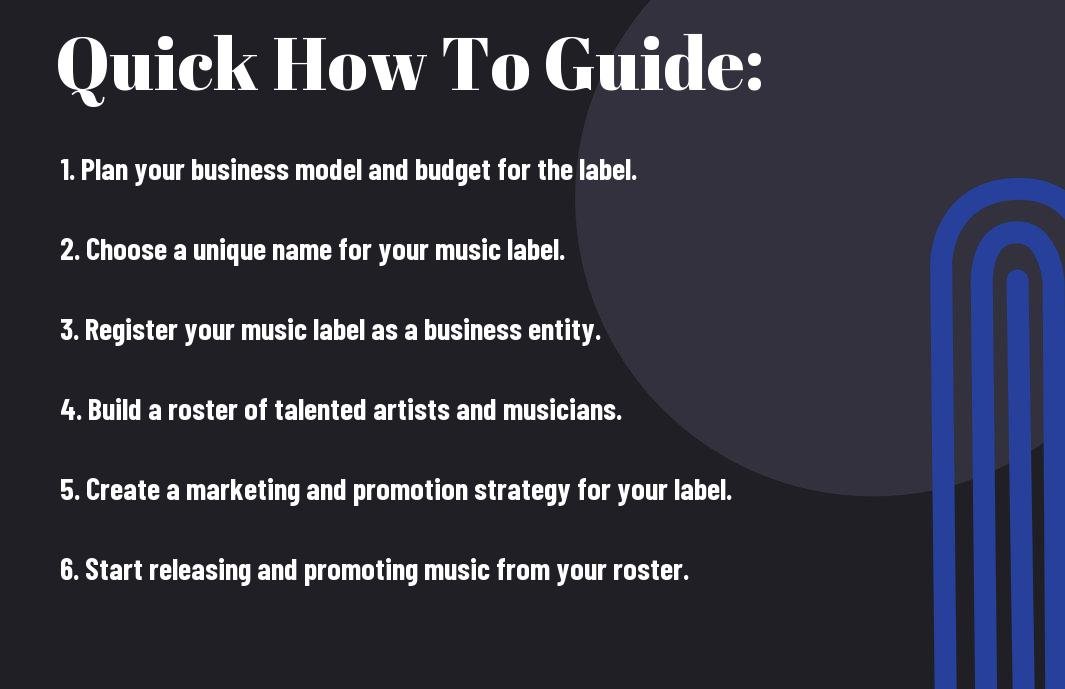Acquiring a music label can be a daunting task, but with the right knowledge and determination, I believe that you can successfully establish your own music label. Setting up your own label can be challenging and time-consuming, but the rewards can be well worth the effort. In this blog post, I will share with you the steps and strategies to secure and build your own music label, including finding and signing talented artists, promoting and distributing music, and navigating legal and financial considerations. By the end of this post, you will have a solid understanding of how to achieve your dream of owning a successful music label.
Key Takeaways:
- Understanding the Music Industry: Before establishing your own music label, it’s crucial to have a deep understanding of the music industry, including the latest trends, challenges, and opportunities.
- Building a Solid Business Plan: A well-thought-out business plan is essential for the success of your music label. It should include your goals, target audience, marketing strategies, and financial projections.
- Developing Relationships with Artists: Cultivating strong relationships with talented artists is key to establishing a successful music label. This involves scouting for talent, offering attractive deals, and providing the necessary support and resources.
- Legal and Financial Considerations: It’s important to navigate the legal and financial aspects of starting a music label, including contracts, royalties, licensing, and distribution agreements.
- Adaptability and Persistence: The music industry is constantly evolving, so it’s essential to remain adaptable and persistent in the face of challenges. Building a music label requires determination and a willingness to adapt to new trends and technologies.
Understanding the Music Industry
The music industry is a complex and constantly evolving landscape. It encompasses not only the creation and production of music but also the distribution, marketing, and management of artists and their work. As a potential music label owner, it is crucial to have a deep understanding of the various components of the industry and how they intersect.
How-to Navigate the Music Industry
When navigating the music industry, it is essential to stay informed about the latest trends and developments. Networking with other industry professionals, attending music events, and keeping an ear to the ground for new talent are all important steps. Additionally, understanding the legal and financial aspects of the industry is crucial for long-term success.
Tips for Establishing Your Music Label
Establishing your own music label requires careful planning and strategic decision-making. To begin, identify a niche or genre that you are passionate about and have knowledge of. Research the market to identify potential gaps or opportunities for your label. Invest in building a strong team of professionals, including artists, producers, marketers, and legal advisors. Create a solid business plan that outlines your goals, target audience, and revenue streams. Lastly, be prepared to invest time, effort, and resources into the label’s growth. Assume that challenges and setbacks will occur, but with determination and perseverance, you can overcome them.
Factors to Consider in Establishing Your Music Label
Even before diving into the process of establishing your music label, it’s important to consider a few essential factors that will heavily influence your label’s success. Here are some of the key aspects you’ll need to keep in mind:
- Market Research: Before launching your music label, it’s crucial to conduct thorough market research to understand the current industry landscape and identify any gaps or opportunities for your label.
- Legal Requirements: Establishing a music label involves several legal formalities, including business registration, copyright laws, and contracts. These legal aspects are critical to ensure a smooth and legitimate operation.
- Financial Planning: Running a music label requires substantial financial investment for recording, marketing, and promoting artists. Therefore, sound financial planning is necessary to sustain your label in the long run.
- Networking: Building strong connections and relationships within the music industry is essential. Networking with other label owners, artists, producers, and industry professionals can open doors to collaborations and opportunities for your label.
The success of your music label hinges on how well you consider and address these factors during the establishment phase. As an aspiring label owner, it’s imperative to thoroughly evaluate these aspects and devise a comprehensive plan that encompasses them.
How to Create a Business Plan
Creating a business plan is a fundamental step in establishing your music label. Your business plan should outline your label’s vision, mission, target market, financial projections, and marketing strategies. It serves as a roadmap for your label’s growth and provides a clear direction for your business endeavors. Additionally, a well-crafted business plan is crucial for attracting potential investors and securing funding for your label’s operations. Take the time to develop a thorough and detailed business plan that outlines your short-term and long-term goals, and the strategies you’ll implement to achieve them.
Tips for Finding and Signing Artists
Finding and signing talented artists is a vital aspect of running a successful music label. When scouting for potential talent, focus on artists who align with your label’s brand and genre. Build a diverse roster of artists to appeal to a broad audience. When signing artists, ensure clear communication and transparency in contractual agreements, including royalty rates, rights, and obligations. Knowing the market trends and understanding the artistic vision of potential signees will help you make informed decisions and cultivate mutually beneficial relationships with your artists.
Building Your Music Label
After establishing your music label, the next step is to focus on building and growing it into a successful brand. This involves developing your brand and image, as well as marketing and promoting your label to reach a wider audience and increase your visibility in the music industry.
How-to Develop Your Brand and Image
When it comes to developing your brand and image, consistency is key. This includes creating a unique and memorable logo, color scheme, and overall aesthetic that reflects the music and artists you represent. You want to establish a distinct identity that sets you apart from other labels and resonates with your target audience. Additionally, building a strong online presence through a professional website and active social media profiles can help increase your visibility and credibility within the industry.
Tips for Marketing and Promoting Your Label
Effective marketing and promotion are crucial for the success of your music label. Utilize strategic partnerships and collaborations with other industry professionals to expand your reach and gain exposure. Additionally, embrace digital marketing strategies such as social media advertising, influencer partnerships, and email marketing to connect with and engage your audience. Creative storytelling through press releases, artist interviews, and behind-the-scenes content can also help humanize your label and establish a connection with your audience. Recognizing the importance of building and maintaining relationships with media outlets, influencers, and industry professionals is essential for securing widespread coverage and support for your label and artists.

To wrap up
Establishing your own music label is a challenging but rewarding endeavor. It requires dedication, hard work, and a clear vision for the kind of music you want to promote. From securing funding to scouting talent, there are many steps involved in launching a successful music label. However, with perseverance and a strong business plan, it is possible to build your own music empire. By following the steps outlined in this guide, you can lay the groundwork for a thriving music label that supports and promotes talented artists, and makes a meaningful impact on the music industry.
How to Get a Music Label – Establishing Your Own Music Label FAQ
Q: What is a music label?
A: A music label, also known as a record label, is a company that markets and distributes music recordings. It often provides A&R (Artist and Repertoire) services, helping to discover and develop new musicians.
Q: Why would I want to establish my own music label?
A: Establishing your own music label gives you the opportunity to have creative control over the music you release. It also allows you to support and promote up-and-coming artists, and potentially create a successful business in the music industry.
Q: What are the steps to establish a music label?
A: The steps to establish a music label include creating a business plan, registering your label as a legal entity, obtaining necessary licenses and permits, building a professional network, and securing distribution and marketing channels for your music releases.
Q: What skills and knowledge are needed to run a music label?
A: Running a music label requires a deep understanding of the music industry, including copyright laws, marketing strategies, and artist management. Having strong business acumen, negotiation skills, and a passion for music are also crucial for success.
Q: How can I finance the startup of my music label?
A: Financing the startup of a music label can be achieved through various means, including personal savings, loans, private investors, crowdfunding, or partnerships with established industry players. It is important to carefully consider the financial implications and plan for sustainable growth of the label.




